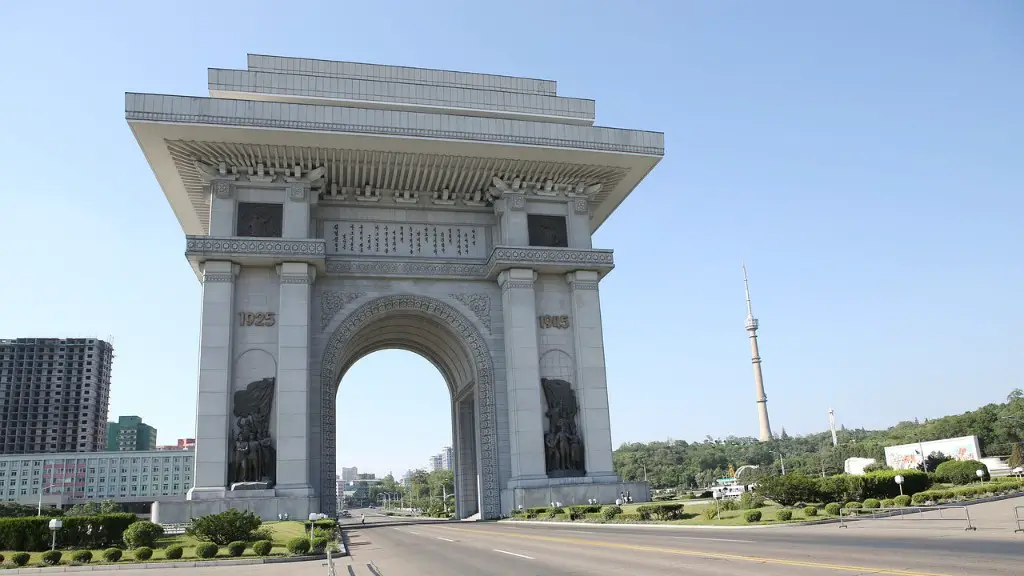Introduction
As tensions between the United States and North Korea continue to climb, the question of whether or not the United States should consider the option of bombing North Korea is one that has been discussed for some time. It is a complicated, multi-faceted debate, with some people arguing in favor of the idea and others strongly opposed. In this article, we will explore the pros and cons of this proposal, as well as look at some of the potential implications of a bombing campaign. We will also look at what experts have to say about the potential effects of bombing North Korea.
The Military Perspective
From a military standpoint, there is an argument to be made for bombing North Korea. It’s a country that has an active nuclear weapons program and a long history of belligerence towards its enemies. It’s no secret that North Korea is developing a nuclear arsenal and that they pose a threat to the world. Bombing strategic targets in North Korea could be a way to show them that their aggression has serious consequences.
From a tactical standpoint, the United States has many advantages. The country is far away, making it difficult for North Korean forces to respond, and the US has some of the most powerful air forces in the world. In addition, the US Navy has the ability to protect ships from North Korean attacks. This would make it difficult for North Korea to respond with a retaliatory strike, making bombing an attractive option.
The Political Perspective
The political implications of bombing North Korea are enormous. From a geopolitical standpoint, the United States would be entering a precarious situation. North Korea’s allies, China and Russia, could become involved, as could the US’s allies in the region. This could lead to a broader conflict and an untold loss of life. In addition, a bombing campaign would undoubtedly strain US relations with China and Russia, which could have economic and political ramifications.
Furthermore, a bombing campaign could result in a humanitarian crisis. North Korea is a closed, repressive society, with the United Nations estimating that around 18 million of the country’s population of 25 million are in need of humanitarian aid. A bombing campaign could cause an immense amount of loss of life and further strain the already struggling populace.
Finally, a bombing campaign could also result in the displacement of North Korean refugees. North Korea’s borders are heavily controlled, and it is unlikely that the North Korean government would allow the free movement of citizens out of the country. This could cause a humanitarian crisis as millions of people are forced to flee their homes.
The Moral Argument
The moral implications of bombing North Korea should also be considered. Ultimately, any decision to use force would result in the death of civilians, which is something that no one should take lightly. Even if the bombing were successful in destroying North Korea’s nuclear weapons program and preventing them from further aggression, it would be at a great cost. The United States would be responsible for the deaths of thousands of innocent people, and it is unclear if the benefits would be worth the moral cost.
The Economic Argument
From an economic standpoint, the cost of bombing North Korea is unclear. The United States already spends billions of dollars every year on military actions, and a bombing campaign could require even more. Furthermore, there would also be an economic cost to the United States’ allies in the region. If conflict were to break out, the region could suffer from mass losses and destabilization, which could adversely affect their economies.
Finally, a conflict could also lead to sanctions and embargoes, which could further destabilize the world economy. It is difficult to predict exactly how an economic conflict with North Korea would unfold, but it is safe to assume that it would not be without cost.
The International Reacton
In addition to the economic, moral and political implications, the international reaction to a bombing campaign would be hard to predict. It is likely that many countries in the international community would condemn the action and attempt to rally the world against the United States. Major allies of the United States, such as Japan and South Korea, could be put in a difficult position as they try to maintain their support of the US while also attempting to negotiate with North Korea.
Furthermore, there could also be an effect on global sentiment towards the US. The international community could view a bombing campaign as an act of aggression and a violation of international law, and it could lead to a loss of support from previously friendly countries.
The Nuclear Threat
Finally, it is worth noting that North Korea does indeed have the capacity to retaliate with a nuclear strike. North Korea has tested a number of ballistic missiles, some of which have the potential to reach the US mainland. As such, any decision to bomb North Korea would require the US to take steps to protect itself from a potential attack. This could include deploying additional missile defense systems and increasing military readiness.
The Psychological Effect of Bombing
In addition to the risk of a nuclear attack, it is also important to consider the psychological effects of a bombing campaign. North Korea’s leaders are unpredictable and the country has a history of responding to aggression with unpredictable behavior. Bombing North Korea could result in a dramatic escalation of tensions, making the situation even more dangerous than it already is.
Studies have also shown that bombing can have a lasting psychological impact. People who are exposed to violence can suffer from PTSD, depression and other psychological disorders. If a bombing campaign were to take place, it is possible that the North Korean people would suffer from a lasting psychological trauma that could be difficult to address.
The North Korean People
Finally, it is important to consider the effect that a bombing campaign would have on the North Korean people. Although North Korea is a repressive society and its leaders have violated human rights, it is still home to millions of people who have no say in their government’s policies. These people are innocent victims in this conflict, and they would suffer greatly if a bombing campaign were to occur.
Furthermore, there is also the risk that a bombing campaign could be used as a tool of propaganda by the North Korean regime. The regime could use the bombings as a way to further repress its citizens and to encourage them to rally around the government. This could make the situation worse, rather than better.
Negotiations and Sanctions
Given the risks associated with bombing North Korea, it may be better to seek a diplomatic solution instead. Negotiations with North Korea have been difficult, but they have yielded some results. Furthermore, the United Nations has imposed sanctions on North Korea in an effort to force them to abandon their nuclear weapons program. It is likely that continued diplomatic pressure and sanctions would be more effective than military action in curbing North Korea’s aggression.
Conclusion
In conclusion, the debate over whether or not the United States should consider the option of bombing North Korea is a complex one. There are pros and cons to the proposal, and there are many potential implications. The cost to the United States, both financially and morally, could be high, and the risk of an unexpected retaliation is real. It is best to approach this debate with caution, and to consider all of the potential risks and implications before making a decision.


